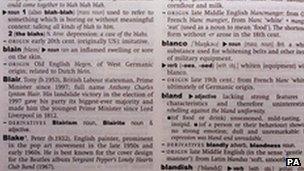What is your word (or expression) of the year?
- Published
- comments

Will bunga bunga make it into the OED?
The lexicographers at the Oxford English Dictionary (OED) have come up with their Word of the Year. Actually, they haven't. They've come up with an expression - squeezed middle.
It was a term coined by Ed Miliband - not a person one instantly associates with wordsmithery - while in conversation with John Humphrys on the Today Programme. John, a man who takes a keen interest in the English language, asked what the Labour leader meant by squeezed middle. Mr Miliband gave a slightly faltering answer in which he mentioned something about the broad middle classes in this country who find themselves financially hard pressed.
I don't think John was wholly convinced by the on-the-spot explanation, but will no doubt be relieved that the academics at OED, who have had rather longer to think about it, have come up with this definition:
"Squeezed Middle: the section of society regarded as particularly affected by inflation, wage freezes and cuts in public spending during a time of economic difficulty, consisting principally of those on low or middle incomes".
Frankly, the description is so wide-ranging and vague as to be bordering on meaningless. I'd associate the phrase with a toothpaste tube. But no matter, squeezed middle it is. The value in this exercise is not so much which word (or phrase) is chosen (it/they does not necessarily make it into the OED), but the annual event provokes a discussion about our evolving language.
Oxford Dictionaries' Suzie Dent and Oliver Kamm, who writes the Times's Pedant column, discuss if this phrase is a worthy winner
The American version also chooses a word, which is normally different to the UK choice, but this year is the same. That's a surprise. Does or has anybody in the USA used the phrase squeezed middle?
Apparently, according to Susie Dent - the intellectual who sits in Dictionary Corner on Channel 4's Countdown show - Bill Clinton once talked about hard-pressed working families being 'squeezed in the middle'. But that is not the same. Would Clinton, or Obama for that matter, conjure up such a graceless term as 'squeezed middle'.
Last year the Americans went for app, while we plumped for another phrase - Big Society. I would have thought both of these have a much higher chance of surviving and becoming part of our everyday language (you could argue app already has), than the clunky and ill-defined squeezed middle.
What is most surprising about this year's choice is the alternatives the selection team consider, several of which - to my mind - are clearer and have a far greater chance of taking their place in our day-to-day language. Here are the runners up, with OED explanations:
Arab Spring: a series of anti-government uprisings in various countries in North Africa and the Middle East, beginning in Tunisia in December 2010. [After Prague Spring, denoting the 1968 reform movement in Czechoslovakia.]
Hacktivism: the action or practice of gaining unauthorized access to computer files or networks in order to further social or political ends. [A blend of hack and activism]
Occupy: the name given to an international movement protesting against perceived economic injustice by occupying buildings or public places and staying there for an extended period of time. [From the imperative form of the verb occupy, as in the phrase Occupy Wall Street.]
Phone hacking: the action or practice of gaining unauthorized access to data stored in another person's phone, especially in order to access their voicemail.
Sodcasting: (informal) the practice of playing music through the loudspeaker of a mobile phone while in a public place. [After podcasting]
The longlist included:
bunga bunga, as used in the context of former Italian Prime Minister Silvio Berlusconi's infamous parties
crowdfunding, defined as the practice of funding a project or venture by raising many small amounts of money from a large number of people, typically via the Internet
facepalm, a gesture in which the palm of one's hand is brought to one's face as an expression of dismay, exasperation, embarrassment, etc.
and fracking, the forcing open of fissures in subterranean rocks by introducing liquid at high pressure, especially to extract oil or gas
Susie Dent, who is acting as the OED's Word of the Year spokesperson, said:
"It is not a jolly set. If there was no obvious winner, there was a very clear prevailing mood. Financial hardship and protest on an almost unprecedented scale have scored our language deeply (and no doubt many others too), and frivolous word-play was hard to find. Most striking of all is that so many of the prominent words this year are not new - they are terms with a long past, but a new resonance."
The rules state that the word, or expression, does not have to be new, but simply have particular currency in the given year. Of the list that was under consideration I would have chosen Arab Spring, as it seems quite clear that it is an expression that will be used by historians to describe and discuss the political events across the Middle East earlier this year.
If, however, I were compiling the short-list I would include, face time (meaning either to arrange a face-to-face meeting, or one taking place virtually via the Internet), or jog on (an old expression that is new to me, which I wrote about in the summer).